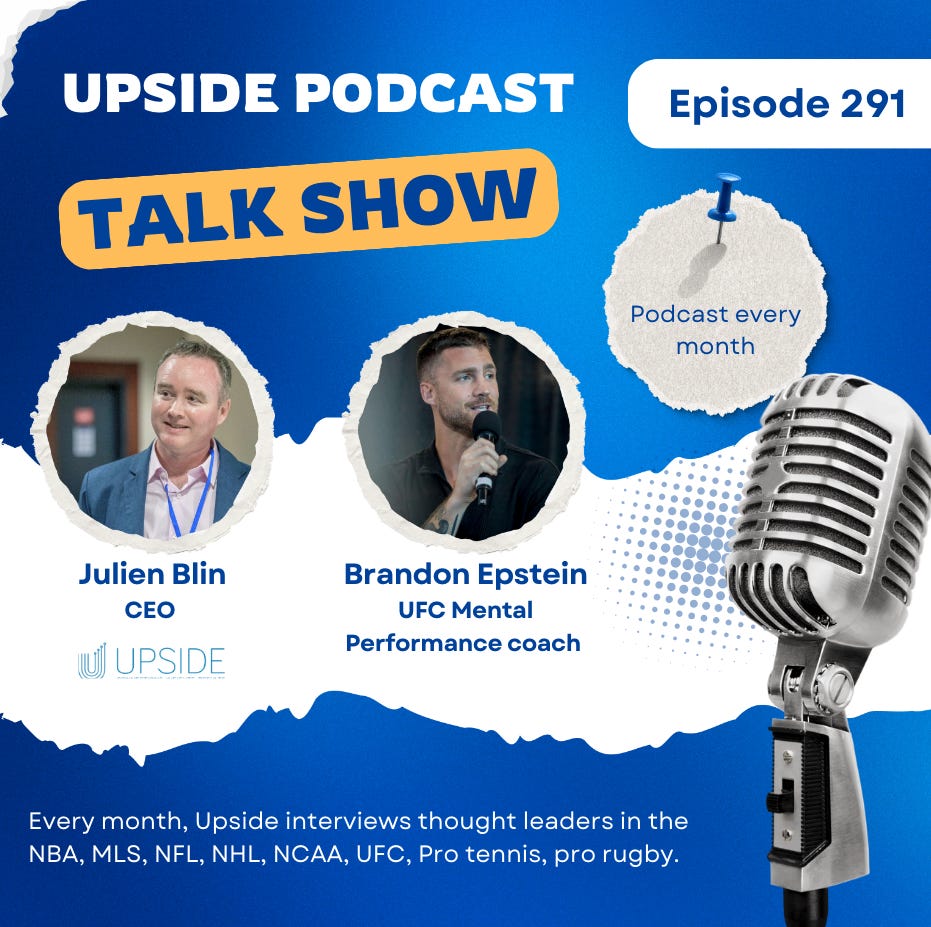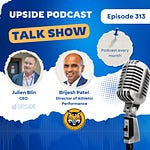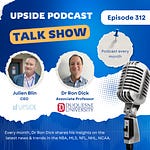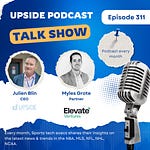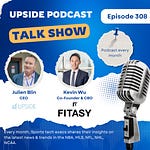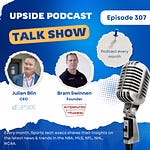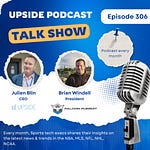Today we have the honor of interviewing Brandon Epstein, a mental performance coach that works with athletes and ceos, entrepreneurs, and high achievers.
Brandon Epstein is a leading mental performance coach known for his work with top athletes in the UFC and other professional sports leagues. He has worked closely with high-level fighters such as UFC welterweight contender Sean Brady and former UFC middleweight champion Chris Weidman, helping them strengthen the psychological side of their preparation. Epstein blends sports psychology, mindfulness, and cognitive training into a practical, actionable framework that athletes can apply in high-pressure moments—from title fights to career-defining performances.
His approach focuses on building emotional regulation, sharpened focus, and sustainable confidence, enabling athletes to show up mentally prepared and resilient when the stakes are highest. As more fighters and athletes credit his coaching with elevating their mindset and performance, Epstein continues to establish himself as one of the most trusted mental coaches in elite sports.
Picture: Brandon Epstein and a UFC Fighter Shane Mosley Jr
You can watch the video interview below by clicking on the Youtube link. You can also listen to the audio interview by clicking on the link at the top of the page:
Brandon also was on the Joe Rogan Experience show where he spoke about the type of work he does with UFC fighters.
Brandon is the author of a book entitled “The Success Code: The High Performance Playbook for Eliminating Mental Barriers and Scaling Your Career, Relationships and Health”.
📝Show Notes: In our interview with Brandon, we discussed how his journey began as a college football player searching for solutions to his own struggles, which led him into a deep path of self-discovery and eventually to 17 years of mental performance coaching with UFC fighters, athletes, CEOs, and entrepreneurs. He explained his core methodology — the Rewired Method — a somatic, subconscious-focused approach designed to uncover and transform emotional scar tissue, clear fears, and build true presence and confidence. Brandon also walked through his intake process, the importance of addressing all areas of a client’s life, and why most of the mental work is done long before an athlete steps into competition.
We also talked about how he helps clients manage pressure, including techniques like breath work to regulate arousal levels and visualization to reinforce game plans. Brandon shared a powerful example of guiding an undefeated fighter through an “ego death” after his first loss to rebuild a grounded, confident identity. Finally, he emphasized a universal lesson for anyone pursuing high performance: the importance of being yourself, owning your unique strengths, and not trying to project an identity that isn’t authentically yours.
You can read the full transcript of the podcast interview with Mark located at the top of this blog post.
Here are the quotes from the interview with Brandon:
1. Your Journey & Background
• “I was a college football player and I was struggling in my freshman year, so I went searching for solutions. I was a seeker looking for more knowledge to help me grow, and that very coincidentally led me into the path of awakening — understanding my role here in the universe, what my purpose is, and what my connection is to a higher power. I started to learn the power that I had, that I am a creator of everything that I experience in this life, and I create through my focus and my choices.”
• “I came back the next year, had a lot of success playing football, started sharing all these tools with my teammates, and they loved it. I got a grant to do a study while I was in college to expand on this coursework, and I haven’t looked back since. For the last 17 years, I’ve continued to bring it to CEOs, entrepreneurs, UFC fighters, and all types of professional athletes.”
• “As I’m in it, I can only take people as far as I’ve gone. The continual work is how much I can continue to expand my capacity so that I can light the torch for others.”
2. Core Philosophy
• “I created something called the Rewired Method, and what I’m doing is taking my clients on a journey from awareness. Most people aren’t conscious of what their true deficiencies actually are. They might be conscious of some negative thoughts or emotions, but they’re not aware of where the real blockages lie — which is at the subconscious level.”
• “Through my method, we uncover where those deficiencies lie. I fundamentally rewire the subconscious of my clients. I leave everything that’s working — any empowering piece of code stays — and I focus specifically on every piece of code that’s creating chaos, confusion, low confidence, anxiety, or uncertainty.”
• “Once you rewire yourself, you’re able to get to a place of pure presence. Then the decisions you make — whether you’re a CEO or an athlete — come through clearly because there are no longer disempowering pieces of code distracting you or pulling you into the past or the future.”
• “Even though people call me a mental performance coach, it’s really not mind-based work — it’s body work. This is deep somatic work. Emotional scar tissue from trauma lives in the body, and the only way to release the past is to go into that emotional scar tissue somatically. That’s how we dissolve it and free someone to meet the present moment fully.”
3. Working with Fighters
• “Everyone gets the same intake process whether you’re a CEO or an athlete. We are all unique people, and performance is holistic. So I analyze how they’re doing mentally, emotionally, physically, how they feel about their career, their finances, and the most important relationships in their life. We just take inventory — where is everything at, really?”
• “Then I take them into a process of getting to the feeling they want in each one of these areas. It’s not just about what is going to be created — it’s about how it feels to get each bucket to a 10 out of 10. Once they can feel it, then we start grooving the subconscious patterns to make it real. We reverse engineer everything from the desired reality.”
• “Often people already know a lot of the things they need to start doing or stop doing. I help them come to awareness around that and hold them accountable. That first session is all about getting clear on where they are and where they want to go, and then we begin closing the gap immediately.”
4. Managing Pressure & Adversity
• “Physically, mentally — 99% of the work is already done before a fighter steps into the cage. The performance is just everyone getting to see the work you’ve been doing. You’re not going to become more conditioned in the middle of a fight. You’re not going to become more skilled. It’s the same mentally — the heavy lifting has already happened.”
• “Every fighter I’ve worked with has told me they felt the best they’ve ever felt going into a fight after we’ve done our camp together because we’ve cleared out all the fears. We’ve exposed them, they’ve seen them, they’ve gone through the ego death of living the fears, and we release them through the Rewired Method.”
• “When they’re in the locker room, the job is already done mentally. But if they’re too high strung, I have them put a hand on their belly and take deep, slow breaths to drop them into parasympathetic. If they’re too low, I have them do breath of fire — powerful exhales — to activate the sympathetic nervous system and raise the intensity.”
• “I had a fighter who was undefeated, but his identity of being unbeatable was tied to perfectionism. When he finally lost, he essentially self-sabotaged because he was living in anxiety and overthinking. The belief ‘I can be beaten’ became emotional scar tissue stored in his body.”• “I had to take him through a full ego death — fully accepting that yes, he can be beaten. What we can’t accept will never change. What we resist persists. Once he accepted it, we created the spaciousness to reprogram a new piece of code. He stepped into a new identity rooted in true, heart-centered confidence. He’s been undefeated ever since.”
5. Lessons Beyond the Octagon
• “The biggest lesson is to be yourself. Don’t try to be something you’re not, and don’t try to project an identity you think you should be projecting. You have to honor who you truly are — that gives you the best chance to win.”
• “There might be a ceiling on what that identity can achieve, and there’s acceptance around that. But owning your true identity — your gifts, your strengths — can carve out an entire career. Don’t try to be the guy who creates his own shot if that’s not who you are. Own what makes you unique.”
• “We all have unique talents and unique gifts. You’re bypassing God if you’re not honoring those. When you bypass God, you’re no longer connected to the source. Honoring your unique gifts gives you the best opportunity for success and fulfillment in sports, business, and life.”
6. The Best way to reach out to Brandon
• “You can reach out to me on any of the platforms on my Instagram. You can email me, go to my website — my website’s at brandonepstein.com. You can apply there or shoot me a message in the contact form.”
You may also like:


